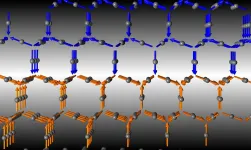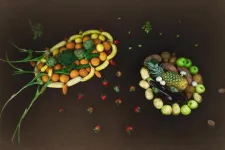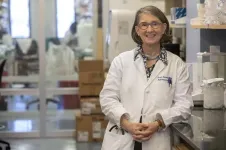(Press-News.org) Though it might seem inanimate, the soil under our feet is very much alive. It's filled with countless microorganisms actively breaking down organic matter, like fallen leaves and plants, and performing a host of other functions that maintain the natural balance of carbon and nutrients stored in the ground beneath us.
"Soil is mostly microorganisms, both alive and dead," says END
Why scientists want to solve an underground mystery about where microbes live
BU researchers develop first-of-its-kind model to predict which species of soil organisms live in different environments, with huge implications for agriculture, climate change, and public health
2021-06-04
ELSE PRESS RELEASES FROM THIS DATE:
Magnetism drives metals to insulators in new experiment
2021-06-04
Like all metals, silver, copper, and gold are conductors. Electrons flow across them, carrying heat and electricity. While gold is a good conductor under any conditions, some materials have the property of behaving like metal conductors only if temperatures are high enough; at low temperatures, they act like insulators and do not do a good job of carrying electricity. In other words, these unusual materials go from acting like a chunk of gold to acting like a piece of wood as temperatures are lowered. Physicists have developed theories to explain this so-called metal-insulator transition, but the mechanisms behind the transitions are not ...
Beyond synthetic biology, synthetic ecology boosts health by engineering the environment
2021-06-04
There's a lot of interest right now in how different microbiomes--like the one made up of all the bacteria in our guts--could be harnessed to boost human health and cure disease. But Daniel Segrè has set his sights on a much more ambitious vision for how the microbiome could be manipulated for good: "To help sustain our planet, not just our own health."
Segrè, director of the END ...
New drug effective against lung cancers caused by common genetic error
2021-06-04
A new drug reduced tumor size in patients who have lung cancer patients with a specific, disease-causing change in the gene KRAS, a study found.
The results of the CODEBREAK 100 phase 2 clinical trial were presented June 4, 2021, at the American Society of Clinical Oncology (ASCO) annual meeting and published simultaneously in the New England Journal of Medicine. The efficacy and safety of the drug sotorasib, developed by Amgen Inc., was tested in patients with non-small-cell lung cancer (NSCLC) harboring a specific change, or mutation, in the DNA code for KRAS.
The KRAS mutant protein targeted in the study was p.G12C, in which a glycine building ...
New form of silicon could enable next-gen electronic and energy devices
2021-06-04
Washington, DC--A team led by Carnegie's Thomas Shiell and Timothy Strobel developed a new method for synthesizing a novel crystalline form of silicon with a hexagonal structure that could potentially be used to create next-generation electronic and energy devices with enhanced properties that exceed those of the "normal" cubic form of silicon used today.
Their work is published in Physical Review Letters.
Silicon plays an outsized role in human life. It is the second most abundant element in the Earth's crust. When mixed with other elements, it is essential for many construction and infrastructure projects. And in pure elemental form, it ...
Social identity within the anti-vaccine movement
2021-06-04
A study of more than 1,000 demographically representative participants found that about 22 percent of Americans self-identify as anti-vaxxers, and tend to embrace the label as a form of social identity.
According to the study by researchers including Texas A&M University School of Public Health assistant professor Timothy Callaghan, 8 percent of this group "always" self-identify this way, with 14 percent "sometimes" identifying as part of the anti-vaccine movement. The results were published in the journal Politics, Groups, and Identities.
"We found these results both surprising and concerning," Callaghan said. "The fact that 22 percent of Americans at least sometimes identify as anti-vaxxers was much higher than expected and demonstrates ...
Colorectal Cancer: UVA Health Expert Helps Develop New National Screening Guidelines
2021-06-04
Most Americans should get screened for colorectal cancer beginning at age 45 instead of age 50, according to new recommendations from the U.S. Preventive Services Task Force, which includes UVA Health's Li Li, MD, PhD, MPH. This recommendation applies to Americans without symptoms who do not have a history of colorectal polyps or a personal or family health history of genetic disorders that increase the risk of colorectal cancer.
Colorectal cancer is the third-leading cause of cancer death in America, according to the Task Force, and an increasing number of cases are being diagnosed in younger Americans. The Task Force notes that colorectal cancer diagnoses among Americans ages 40 to 49 increased by almost 15% from 2000-02 to 2014-16. Black ...
Vitamin D may not protect against COVID-19, as previously suggested
2021-06-04
While previous research early in the pandemic suggested that vitamin D cuts the risk of contracting COVID-19, a new study from McGill University finds there is no genetic evidence that the vitamin works as a protective measure against the coronavirus.
"Vitamin D supplementation as a public health measure to improve outcomes is not supported by this study. Most importantly, our results suggest that investment in other therapeutic or preventative avenues should be prioritized for COVID-19 randomized clinical trials," say the authors.
To assess the relationship between vitamin D levels and COVID-19 ...
A novel tuberculosis regimen shortens treatment course for patients
2021-06-04
Tuberculosis (TB) is a deadly infection that occurs in every part of the world. The standard treatment for TB, a six-month multidrug regimen, has not changed in more than 40 years. Patients can find it difficult to complete the lengthy regimen, making it more likely that treatment resistance will develop.
A research team led by a Medical University of South Carolina (MUSC) investigator reports in the May 6 issue of the New England Journal of Medicine that a four-month treatment regimen using rifapentine is effective for treating TB. Shortening the treatment duration is an important step toward increased patient adherence.
In 2019 alone, 1.4 ...
UMass Amherst food scientists aim to make plant-based protein tastier and healthier
2021-06-04
As meat-eating continues to increase around the world, food scientists are focusing on ways to create healthier, better-tasting and more sustainable plant-based protein products that mimic meat, fish, milk, cheese and eggs.
It's no simple task, says renowned food scientist David Julian McClements, University of Massachusetts Amherst Distinguished Professor and lead author of a paper in the new Nature journal, Science of Food, that explores the topic.
"With Beyond Meat and Impossible Foods and other products coming on the market, there's a huge interest in plant-based foods for ...
An atom chip interferometer that could detect quantum gravity
2021-06-04
Physicists in Israel have created a quantum interferometer on an atom chip. This device can be used to explore the fundamentals of quantum theory by studying the interference pattern between two beams of atoms. University of Groningen physicist, Anupam Mazumdar, describes how the device could be adapted to use mesoscopic particles instead of atoms. This modification would allow for expanded applications. A description of the device, and theoretical considerations concerning its application by Mazumdar, were published on 28 May in the journal Science Advances.
The device which scientists from the Ben-Gurion University of the Negev created is a so-called Stern Gerlach Interferometer, which was first proposed one hundred years ago by German physicists Otto Stern and Walter ...
LAST 30 PRESS RELEASES:
Bacteria frozen in ancient underground ice cave found to be resistant against 10 modern antibiotics
Rhododendron-derived drugs now made by bacteria
Admissions for child maltreatment decreased during first phase of COVID-19 pandemic, but ICU admissions increased later
Power in motion: transforming energy harvesting with gyroscopes
Ketamine high NOT related to treatment success for people with alcohol problems, study finds
1 in 6 Medicare beneficiaries depend on telehealth for key medical care
Maps can encourage home radon testing in the right settings
Exploring the link between hearing loss and cognitive decline
Machine learning tool can predict serious transplant complications months earlier
Prevalence of over-the-counter and prescription medication use in the US
US child mental health care need, unmet needs, and difficulty accessing services
Incidental rotator cuff abnormalities on magnetic resonance imaging
Sensing local fibers in pancreatic tumors, cancer cells ‘choose’ to either grow or tolerate treatment
Barriers to mental health care leave many children behind, new data cautions
Cancer and inflammation: immunologic interplay, translational advances, and clinical strategies
Bioactive polyphenolic compounds and in vitro anti-degenerative property-based pharmacological propensities of some promising germplasms of Amaranthus hypochondriacus L.
AI-powered companionship: PolyU interfaculty scholar harnesses music and empathetic speech in robots to combat loneliness
Antarctica sits above Earth’s strongest “gravity hole.” Now we know how it got that way
Haircare products made with botanicals protects strands, adds shine
Enhanced pulmonary nodule detection and classification using artificial intelligence on LIDC-IDRI data
Using NBA, study finds that pay differences among top performers can erode cooperation
Korea University, Stanford University, and IESGA launch Water Sustainability Index to combat ESG greenwashing
Molecular glue discovery: large scale instead of lucky strike
Insulin resistance predictor highlights cancer connection
Explaining next-generation solar cells
Slippery ions create a smoother path to blue energy
Magnetic resonance imaging opens the door to better treatments for underdiagnosed atypical Parkinsonisms
National poll finds gaps in community preparedness for teen cardiac emergencies
One strategy to block both drug-resistant bacteria and influenza: new broad-spectrum infection prevention approach validated
Survey: 3 in 4 skip physical therapy homework, stunting progress
[Press-News.org] Why scientists want to solve an underground mystery about where microbes liveBU researchers develop first-of-its-kind model to predict which species of soil organisms live in different environments, with huge implications for agriculture, climate change, and public health





